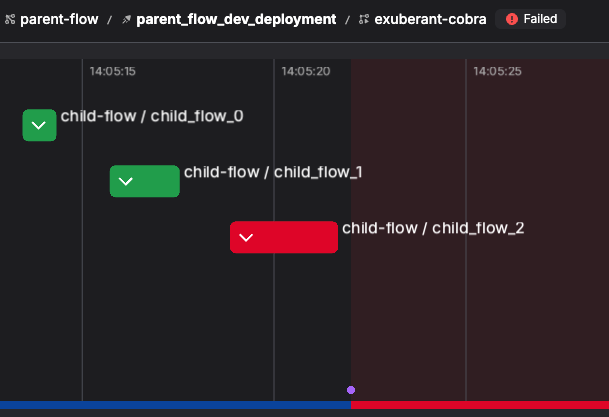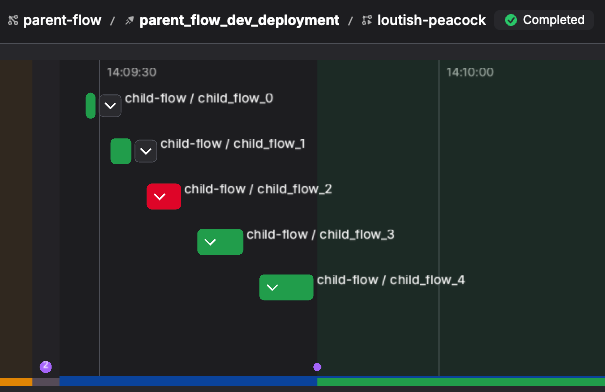Composing Prefect flows with sub-flows
A common use case when working with workflow orchestration tools is running multiple instances of a certain flow with the change of a few parameters. It could be getting satellite data for multiple locations, or retrieving specific files from different sources and delivering them to specific locations. In the interest of keeping the code DRY, of course, the natural way to approach this problem is to define the flow function once, and change the parameters it gets.
Now to run through all the parameters, you’d then need to create a parent flow which sets up and runs the flows with all the different parameters that you want to run. This is where Prefect starts getting a little tricky.
This blog post will highlight a quick gotcha when working with parent-flow and child-flows. (Or flows and sub-flows)
It is important to keep in mind how flow errors are handled in Prefect.
The parent-flow errors out and halts execution upon the first child-flow hitting an error.
This might not be the behaviour that you desire from your flows.
A minimal example
Default behaviour
Here is a simple example of a parent flow, with 5 child flows, where child_flow_2 always fails
from time import sleep
from prefect import flow, serve
@flow(log_prints=True, flow_run_name="child_flow_{flow_param}")
def child_flow(flow_param: int):
sleep(flow_param)
print(f"In flow {flow_param}")
if flow_param==2:
raise ValueError("child_flow_2 always fails")
@flow(log_prints=True)
def parent_flow():
for i in range(0,5):
child_flow(i)
if __name__ == "__main__":
parent_flow_deployment = parent_flow.to_deployment(name="parent_flow_dev_deployment")
serve(parent_flow_deployment)

Desired behaviour
Simply by wrapping the call to child_flow in a try-except statement and handling the exception
we can continue on with the rest of the child-flows.
In Prefect there is an annotation called allow_failure, but there is no documentation on how to use it.
So currently the try-except block is a simple way to get the desired behaviour.
from time import sleep
from prefect import flow, serve
@flow(log_prints=True, flow_run_name="child_flow_{flow_param}")
def child_flow(flow_param: int):
sleep(flow_param)
print(f"In flow {flow_param}")
if flow_param==2:
raise ValueError("child_flow_2 always fails")
@flow(log_prints=True)
def parent_flow():
for i in range(0,5):
try:
child_flow(i)
except Exception as e:
print(f"Exception in child_flow_{i}: {e}")
if __name__ == "__main__":
parent_flow_deployment = parent_flow.to_deployment(name="parent_flow_dev_deployment")
serve(parent_flow_deployment)

In essence, a successful parent flow is one which brings the child-flows into existence and gives them the parameters necessary to run. A child flow succeeding or failing is the child-flow’s business.
